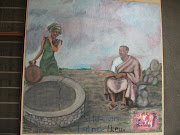the following articles are a serie of reflections that I submitted for the course
Reflection on session one
Practical theological reflection resembles to lectio divina, or better, lectio divina is a form of practical theological reflection. Lectio divina is a holistic and sacred reading of and commentary on the scriptures. It seems to ask, what do these scriptures have to tell me today? As reading, it is really an effort to understanding, to interpreting these Christian classics. Likewise, practical theology is an interpretative, hermeneutical endeavor. It results from the correlation of the interpretation of human experience –the world as it is- and the interpretation of Christian heritage –the world as it should be. But then, what is primary and normative in this task of interpretation? What is the starting point and my perspective? How do experience and Tradition relates to each other so as to bring forth a genuine discipleship? These seem the questions that this first section is asking.
This problematic appears even in the former catechetical pedagogy that provided answers where questions had not been asked at all, or questions that had not been asked. If I profess that Jesus is the answer, I should be able to say to which question. Also, I should not transform theology into an ideology or fall into fundamentalism. This will be a manipulation and abuse of the Tradition. This has led to provide support to slavery and institutionalized racism, Nazism, anti-Semitism, sexism, etc.
And until now, we are dealing with the questions of sexual ethics, gay marriage and other puzzling questions that provoke an electric shock between Tradition and experience.
This first chapter asserts that human experiences, concerns, questions, desires and aspirations, read as signs of times are the starting point of practical theological reflection. Human life is a vocation (p.2); human living is also a locus theologicus. Thus reality is also a way for God to talk to us and guide us. God is our deepest desire. By recognizing world events as signs of the times, we may be eager to see and perceive God’s presence in our time. Today is the Kairos, the appointed time.
But, it is the Tradition that helps us recognize this Kairos, to understand it and attend to it. Thus the practical theologian is a watchman, the shepherd who never sleeps, always alert, vigilant. Tradition is living and embodied memory that has shaped me and has become my criterion in reading the signs of times, in evaluating the present moment and inventing the future. Tradition is a gift to be received and honored, a vocation to be followed, and a question to be answered.
This Tradition, as classic (Tracy), has a revelatory power. It reveals itself to me and tells me how it should be read. It is timeless since it has power to affect people’s lives from all ages, when read according to the context and questions of the particular time and place, and people. Tradition is source of hope since it provides new understanding, new inspiration, and courage to change and be changed.
Thus, the signs of times have to be read in the perspective of faith, in the light of the Christian Tradition. God knows what is best for us. And Tradition reveals to us that our deepest concerns are the concerns and questions of God for us. Thus, true human fulfillment can be achieved only when we engage into the coming of the Kingdom of God, God’s plan for us. As missionaries, we have to be reminders of God’s plan for humanity.
I agree with this view since my being a believer calls me to be the sacrament of God involvement into human life. This is not only for ministers or just for Christians. All living creatures are called and sent by God. Creation is both a vocation and a commission.
Also, it is important to give a perspective of faith to world events and experiences. Without faith, we remain just with human sciences that cannot give hope for life everlasting. When, one looks at issues in Darfur (Sudan), at the war in Iraq, at terrorism, hunger and HIV in Africa, etc without the eyes of faith, it seems that life is not worthy to be lived. But these situations remind us that God has seen our suffering and has sent each one of us as his herald and agent of liberation. Every human being, particularly the Christian has a prophetic vocation and a disciple imperative to follow. Life does not belong to us. We are steward of life, this treasure that we hold in earthly vessels (Paul).
However, according to my limited theological knowledge, it seems that the text is evaluating theology for its usefulness. And God is reduced to one at our service. This tendency seems to perpetuate a dualism within God. I personally understand the concern of God in terms of relationship. Since God is total love, he is reaching out to us so that we too may be part of this divine love. Thus the definition of people in relationship helps understand the nature and purpose of that relationship.
Also, this chapter gave little room to the ecclesial community; and made wonder who is to do the interpretation. Not only the ecclesial community as a whole interprets the signs of the times, this same community has to interpret the Tradition according to context, culture, time, place and other issues of the community.
All in all, practical theology has to be a correlation of experience and Tradition. But experience has to read in the light of Tradition so as it can be understood for what it truly is a vocation and a commission. This is in fact the purpose of the practice of lectio divina, the reading of God’s ways and plan in and for humanity.



No comments:
Post a Comment